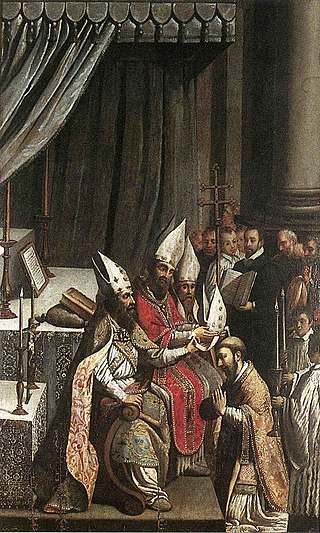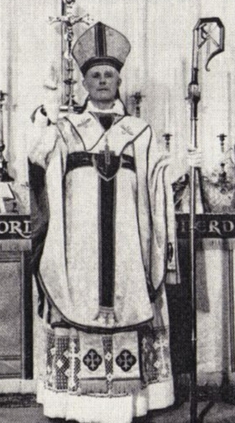
Apostolic succession is the method whereby the ministry of the Christian Church is considered by some Christian denominations to be derived from the apostles by a continuous succession, which has usually been associated with a claim that the succession is through a series of bishops. Those of the Catholic, Eastern Orthodox, Oriental Orthodox, Church of the East, Moravian, Scandinavian Lutheran, Anglican, Hussite, and Old Catholic traditions maintain that a bishop's orders are neither regular nor valid without consecration through apostolic succession. These traditions do not always consider the episcopal consecrations of all of the other traditions as valid.
A bishop is an ordained member of the clergy who is entrusted with a position of authority and oversight in a religious institution. In Christianity, bishops are normally responsible for the governance and administration of dioceses. The role or office of the bishop is called episcopacy. Organizationally, several Christian denominations utilize ecclesiastical structures that call for the position of bishops, while other denominations have dispensed with this office, seeing it as a symbol of power. Bishops have also exercised political authority within their dioceses.

An episcopal polity is a hierarchical form of church governance in which the chief local authorities are called bishops. The word "bishop" here is derived via the British Latin and Vulgar Latin term *ebiscopus/*biscopus, from the Ancient Greek ἐπίσκοπος epískopos meaning "overseer". It is the structure used by many of the major Christian Churches and denominations, such as the Catholic, Eastern Orthodox, Oriental Orthodox, Church of the East, Anabaptist, Lutheran, and Anglican churches or denominations, and other churches founded independently from these lineages. Many Methodist denominations have a form of episcopal polity known as connexionalism.

The Eastern Orthodox Church, officially the Orthodox Catholic Church, and also called the Greek Orthodox Church or simply the Orthodox Church, is the second-largest Christian church, with approximately 230 million baptised members. It operates as a communion of autocephalous churches, each governed by its bishops via local synods. The church has no central doctrinal or governmental authority analogous to the pope of the Catholic Church. Nevertheless, the Ecumenical Patriarch of Constantinople is recognised by them as primus inter pares, a title formerly given to the patriarch of Rome. As one of the oldest surviving religious institutions in the world, the Eastern Orthodox Church has played an especially prominent role in the history and culture of Eastern and Southeastern Europe.
The Eastern Orthodox Church, officially the Orthodox Catholic Church and commonly known simply as the Orthodox Church is a communion composed of up to seventeen separate autocephalous (self-governing) hierarchical churches that profess Eastern Orthodoxy and recognise each other as canonical (regular) Eastern Orthodox Christian churches.

A priest is a religious leader authorized to perform the sacred rituals of a religion, especially as a mediatory agent between humans and one or more deities. They also have the authority or power to administer religious rites; in particular, rites of sacrifice to, and propitiation of, a deity or deities. Their office or position is the "priesthood", a term which also may apply to such persons collectively. A priest may have the duty to hear confessions periodically, give marriage counseling, provide prenuptial counseling, give spiritual direction, teach catechism, or visit those confined indoors, such as the sick in hospitals and nursing homes.

Eastern Christianity comprises Christian traditions and church families that originally developed during classical and late antiquity in the Eastern Mediterranean region or locations further east, south or north. The term does not describe a single communion or religious denomination. Eastern Christianity is a category distinguished from Western Christianity, which is composed of those Christian traditions and churches that originally developed further west.
Full communion is a communion or relationship of full agreement among different Christian denominations or Christian individuals that share certain essential principles of Christian theology. Views vary among denominations on exactly what constitutes full communion, but typically when two or more denominations are in full communion it enables services and celebrations, such as the Eucharist, to be shared among congregants or clergy of any of them with the full approval of each.

The Eastern Catholic Churches or Oriental Catholic Churches, also called the Eastern-Rite Catholic Churches, Eastern Rite Catholicism, or simply the Eastern Churches, are 23 Eastern Christian autonomous particular churches of the Catholic Church in full communion with the pope in Rome. Although they are distinct theologically, liturgically, and historically from the Latin Church, they are all in full communion with it and with each other. Eastern Catholics are a minority within the Catholic Church; of the 1.3 billion Catholics in communion with the pope, approximately 18 million are members of the eastern churches. The largest numbers of Eastern Catholics are found in Eastern Europe, Eastern Africa, the Middle East, and India. As of 2022, the Syro-Malabar Church is the largest Eastern Catholic Church, followed by the Ukrainian Greek Catholic Church.
Greek Orthodox Church is a term that can refer to any one of three classes of Christian churches, each associated in some way with Greek Christianity, Levantine Arabic-speaking Christians or more broadly the rite used in the Eastern Roman Empire.

The Greek Orthodox Patriarchate of Antioch, also known as the Antiochian Orthodox Church and legally as the RūmOrthodox Patriarchate of Antioch and All the East, is an autocephalous Greek Orthodox church within the wider communion of Eastern Orthodox Christianity that originates from the historical Church of Antioch. Headed by the Greek Orthodox patriarch of Antioch, it considers itself the successor to the Christian community founded in Antioch by the Apostles Peter and Paul. It is one of the largest Christian denominations of the Middle East, alongside the Copts of Egypt and the Maronites of Lebanon.
A Christian denomination is a distinct religious body within Christianity that comprises all church congregations of the same kind, identifiable by traits such as a name, particular history, organization, leadership, theological doctrine, worship style and, sometimes, a founder. It is a secular and neutral term, generally used to denote any established Christian church. Unlike a cult or sect, a denomination is usually seen as part of the Christian religious mainstream. Most Christian denominations refer to themselves as churches, whereas some newer ones tend to interchangeably use the terms churches, assemblies, fellowships, etc. Divisions between one group and another are defined by authority and doctrine; issues such as the nature of Jesus, the authority of apostolic succession, biblical hermeneutics, theology, ecclesiology, eschatology, and papal primacy may separate one denomination from another. Groups of denominations—often sharing broadly similar beliefs, practices, and historical ties—are sometimes known as "branches of Christianity". These branches differ in many ways, especially through differences in practices and belief.
The Ukrainian Orthodox Church of Canada is an Eastern Orthodox church in Canada, primarily consisting of Orthodox Ukrainian Canadians. Its former name was the Ukrainian Greek Orthodox Church of Canada (UGOCC). The Church, currently a metropolis of the Ecumenical Patriarchate of Constantinople, is part of the wider Eastern Orthodox communion, however was created independently in 1918.
The Celtic Orthodox Church, also called the Holy Celtic Church, is an autocephalous Christian church founded in the 20th century in France.
Catholicity is a concept pertaining to beliefs and practices that are widely accepted by numerous Christian denominations, most notably by those Christian denominations that describe themselves as catholic in accordance with the Four Marks of the Church, as expressed in the Nicene Creed formulated at the First Council of Constantinople in 381: "[I believe] in one, holy, catholic, and apostolic Church." The English adjective catholic is derived from the Ancient Greek adjective καθολικός, meaning "general", "universal". Thus, "catholic" means that in the Church the wholeness of the Christian faith, full and complete, all-embracing, and with nothing lacking, is proclaimed to all people without excluding any part of the faith or any class or group of people. An early definition for what is "catholic" was summarized in what is known as the Vincentian Canon in the 5th century Commonitory: "what has been believed everywhere, always, and by all."
The Orthodox-Catholic Church of America (OCCA) is an independent and self-governing Christian syncretic jurisdiction based in the United States, with clergy also in Canada, Mexico, Brazil, Africa, and Australia.
Western Rite Orthodoxy, also called Western Orthodoxy or the Orthodox Western Rite, are congregations within the Eastern Orthodox tradition which perform their liturgy in Western forms.

Hugh George de Willmott Newman was an Independent Catholic or independent Old Catholic bishop. He was known religiously as Mar Georgius I and bore the titles, among others, of Patriarch of Glastonbury, Catholicos of the West, and sixth British Patriarch. He was the head of the Catholicate of the West from when he became a bishop, in 1944, until his death in 1979.

The Oriental Orthodox Churches are Eastern Christian churches adhering to Miaphysite Christology, with approximately 50 million members worldwide. The Oriental Orthodox Churches adhere to the Nicene Christian tradition. Oriental Orthodoxy is one of the oldest branches in Christianity.
The Catholicate of the West was a Christian denomination established in 1944 and which ceased to exist in 1994 to become the British Orthodox Church.








